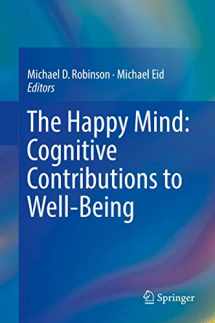
The Happy Mind: Cognitive Contributions to Well-Being
ISBN-13:
9783319587615
ISBN-10:
3319587617
Edition:
1st ed. 2017
Author:
Michael D. Robinson, Michael Eid
Publication date:
2017
Publisher:
Springer
Format:
Hardcover
487 pages
Category:
Cognitive Psychology
,
Behavioral Sciences
,
Cognitive
,
Psychology
,
Movements
,
Sociology
FREE US shipping
Book details
ISBN-13:
9783319587615
ISBN-10:
3319587617
Edition:
1st ed. 2017
Author:
Michael D. Robinson, Michael Eid
Publication date:
2017
Publisher:
Springer
Format:
Hardcover
487 pages
Category:
Cognitive Psychology
,
Behavioral Sciences
,
Cognitive
,
Psychology
,
Movements
,
Sociology
Summary
The Happy Mind: Cognitive Contributions to Well-Being (ISBN-13: 9783319587615 and ISBN-10: 3319587617), written by authors
Michael D. Robinson, Michael Eid, was published by Springer in 2017.
With an overall rating of 4.3 stars, it's a notable title among other
Cognitive Psychology
(Behavioral Sciences, Cognitive, Psychology, Movements, Sociology) books. You can easily purchase or rent The Happy Mind: Cognitive Contributions to Well-Being (Hardcover) from BooksRun,
along with many other new and used
Cognitive Psychology
books
and textbooks.
And, if you're looking to sell your copy, our current buyback offer is $0.3.
Description
This edited volume focuses on different views of happiness and well-being, considering constructs like meaning and spirituality in addition to the more standard constructs of positive emotion and life satisfaction. A premise of the volume is that being happy consists of more than having the right things happen to us; it also depends on how we interpret those events as well as what we are trying to achieve. Such considerations suggest that cognitive-emotional factors should play a fairly pronounced role in how happy we are. The present volume pursues these themes in the context of 25 chapters organized into 5 sections. The first section centers on cognitive variables such as attention and executive function, in addition to mindfulness. The second section considers important sources of positive cognition such as savoring and optimism and the third section focuses on self-regulatory contributions to well-being. Finally, social processes are covered in a fourth section and meaning-related processes are covered in the fifth. What results is a rich and diverse volume centering on the ways in which our minds can help or hinder our aspirations for happiness.


We would LOVE it if you could help us and other readers by reviewing the book
Book review

Congratulations! We have received your book review.
{user}
{createdAt}
by {truncated_author}


